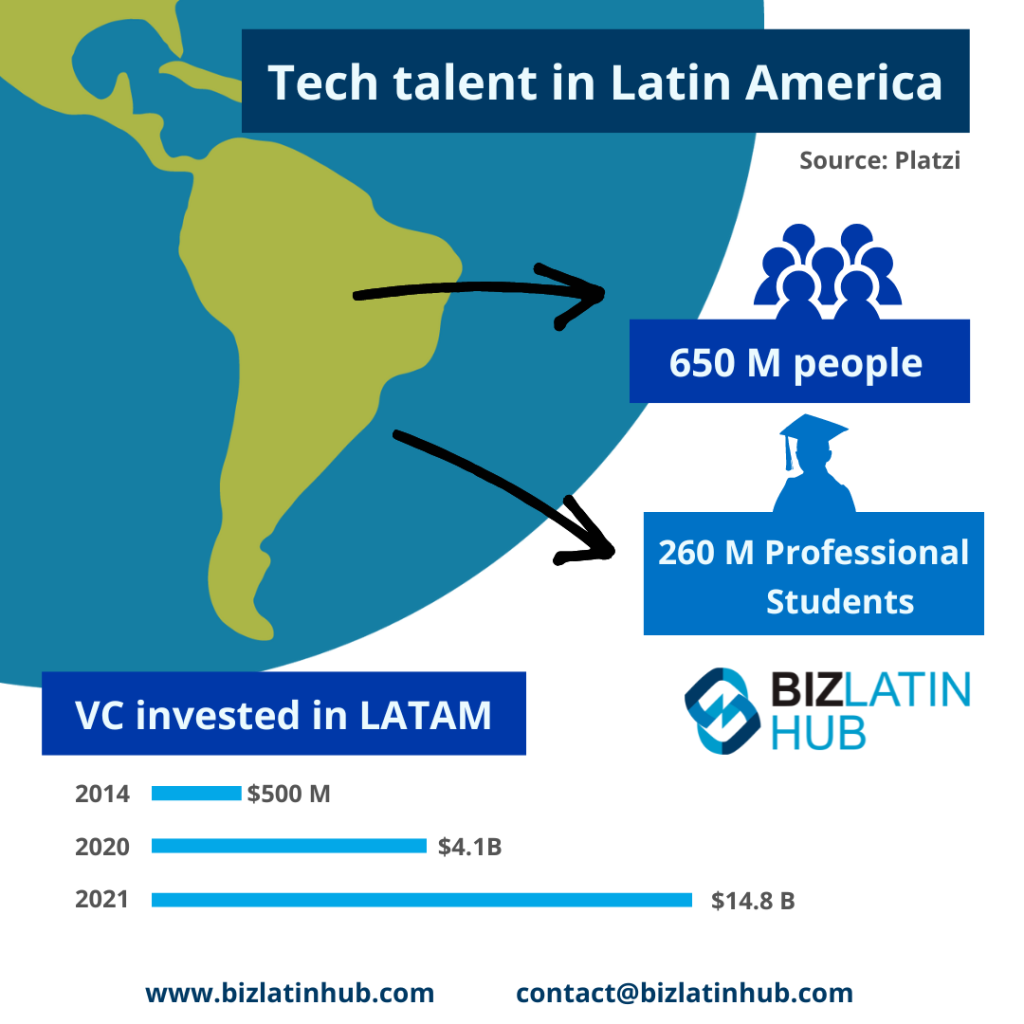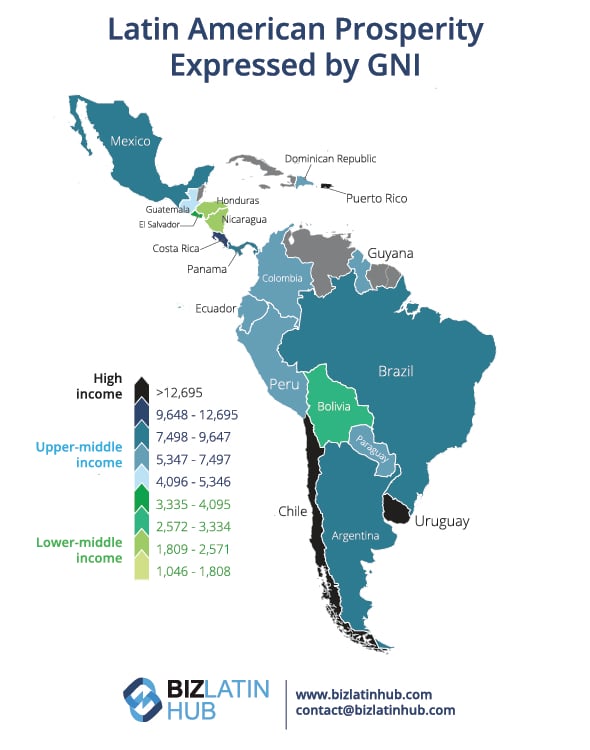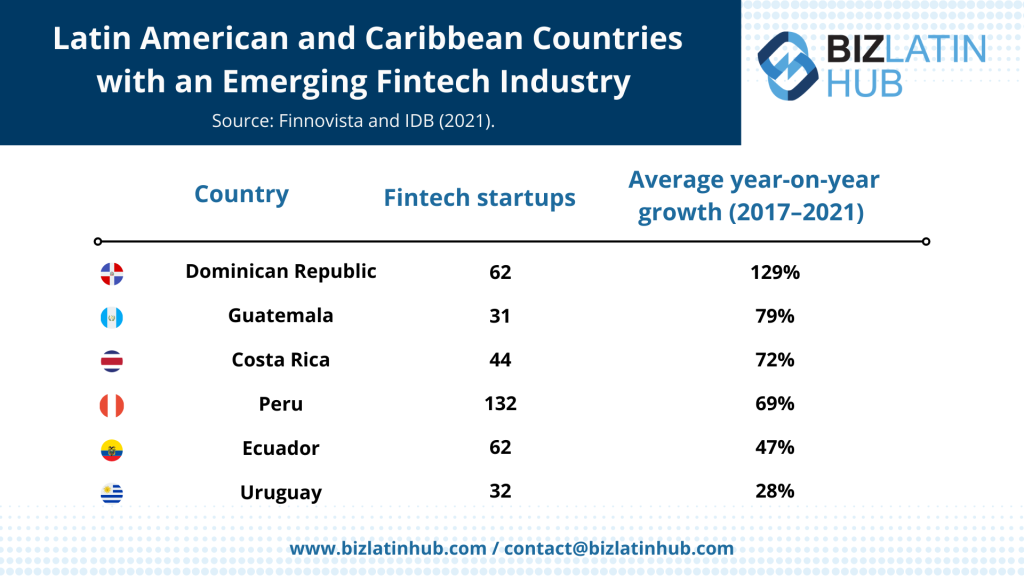According to WorldPay, e-commerce sales in Latin America are expected to hit an incredible USD$118 billion by 2021, the biggest increase in any developed territory. With a diverse, booming market across countries such as Mexico, Colombia, Brazil, Chile, and Panama, there’s never been a better time to invest in an e-commerce business in Latin America.
Thanks to increased middle-class citizenship in the region and a growing appetite for buying online, the industry is one to consider if you want to start an e-commerce business in Latin America. Below, we run through the changes expected in coming years and offer advice on how companies such as yours can benefit from increased demand and various new market opportunities.
Biz Latin Hub can help you with company formation, whether that’s an e-commerce business in Latin America or a more traditional corporation. We know just how the local markets work, thanks to our network of 18 dedicated offices across Latin America and the Caribbean. Our market-leading back office services will make sure you stay fully compliant, no matter where you are.
Growing digital literacy improves e-commerce business in Latin America

As cellular data becomes more accessible to citizens across Latin America and broadband prices fall, internet adoption is on the increase. In 2013, 278 million Latin Americans had access to an internet connection – by the end of 2019, that figure will increase to 387 million – that’s more than half of Latin America’s 626 million population. Smartphone use in the region has also seen a sharp increase in recent years, particularly amongst millennials, with adoption climbing from 78 million in 2012 to a projected 270 million by 2020.
Across the e-commerce market, companies in Latin America are expected to generate more than USD$19,400 million in 2019, with an annual growth rate of 3.5%. According to data from Statista, user penetration in the region is 57.4% and expected to hit 61.1% by 2023. What is perhaps most interesting is that, at present, the average revenue per user is around USD$131 – although that will no doubt rise as consumer confidence increases when buying online.
Various Payment Methods
The world of e-commerce is vast and ever-changing, covering industries from fashion to food delivery, and as such, various payment methods are used around the world. Latin American consumers are comfortable using their credit or debit card, with 65% of buyers using a major card when spending money.
Payment wallets, on the other hand, are another popular choice, with sites such as PayPal being used by 36% of online shoppers at least once, demonstrating the need for businesses to accept payments through multiple vendors to capture sales.
Another key payment method that is popular in Latin America, however, is ‘Cash on Delivery’, used by 35% of online shoppers, although accepting payments through such a method can increase risk and lead to canceled or bogus orders. If you’re considering starting a Latin American e-commerce business, you should be aware of the potential risks.
Fashion Industry is Dominating
Around the world, e-commerce has transformed virtually every business-to-consumer and business-to-business operation, but nowhere more so than in the fashion world. This trend is true in Latin American markets, with fashion sales expected to rise dramatically in 2019.
In the years to come, it’s expected that fashion’s dominance will face more competition – the sector will be valued at USD$17 billion in Latin America by 2022, although electronics will be close behind in second place, at USD$14 billion. With so many Central American businesses looking to boost their bottom lines and add new revenue streams, e-commerce will no doubt serve as a way for them to shift stock and develop brand awareness in new LATAM markets.

Other Industries Will Benefit
Whilst businesses with tangible products will benefit most from the e-commerce boom across Latin America, other industries can also capitalize on its growth. The logistics sector, for example, is in high demand, and with The World Bank rating Latin America’s current logistics as poor, it’s clear there is room for growth.
Some countries require significant levels of investment and innovation, such as Argentina’s logistics sector, to be able to compete with the Western e-commerce model, which offers foreign investors and entrepreneurs significant opportunities for profitability and Latin American domination with the right entry strategy.
Another sector expected to see a sharp increase in demand is Fintech (Financial Technology). As Latin American consumers become increasingly internet literate and discover a whole new world at their fingertips, there will naturally be a higher level of demand for online banking, online payment processing, and financial products.
Fintech company formations in Latin America are already on the rise following government incentives and a slew of international success stories, and Mexico is home to one of the world’s fastest-growing Fintech hubs.

International Holidays Are Increasing in Popularity
Foreign merchants around the world are already entering into Latin America by partnering with distribution firms. Indeed, the beauty of e-commerce is that you do not have to have a logistics or distribution arm in the country yourself. You can sell your products from anywhere in the world and pay someone else to handle the delivery process, streamlining operations and allowing you to become a global business.
Entrepreneurs in markets such as the United States and Europe are piggybacking off of important Latin American holidays to drive sales and boost their market presence in key markets before investing in a full international rollout.
Black Friday and Cyber Monday, for instance, are two of the most important dates in the e-commerce calendar, although some Latin American countries have their own traditions. In Mexico, for example, the ‘El Buen Fin‘ is a weekend-long sales event in lieu of Black Friday.
Children’s Day is another popular date in the e-commerce calendar, where Latin Americans give their children toys. The date differs across countries; in Brazil, it’s celebrated in October, whereas Mexico and Colombia celebrate the data in April, and Argentina’s is in August, so it is important to tie in special events and e-commerce promotions depending on the country you’re operating in. As always, local research and knowledge are required and working with a local marketer or business development specialist will help.
Start your e-commerce business in Latin America with Biz Latin Hub
E-commerce offers a low-risk, high-reward alternative to establishing a brick and mortar business in Latin America, and enables you to sell products in multiple territories without the expense of setting up a physical retail location. Significant digital marketing investment and ongoing promotion are required to remain a key player in people’s minds, however.
Contact us today to discuss how we can support you.
Learn about our team and expert authors who can help you doing business in Latin America for more information.






